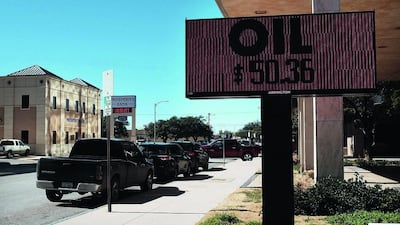The dramatic decline in oil prices reverberated around the world in 2015, prompting changes in both government spending and private sector investment.
The change was brought on by an international oversupply of oil and a decrease in demand in key countries, especially in China where economic growth slowed considerably. Attention immediately focused on the GCC, where members are highly dependent on oil revenues.
Prices fell from a peak of US$115 (Dh422) per barrel in June 2014 to less than $40 per barrel. The GCC countries all need a higher price to balance their budgets. According to the International Monetary Fund (IMF), the UAE’s break-even oil price is $73.60; Kuwait’s is $49.40; Qatar’s $60; Saudi Arabia’s $87.20; Oman’s $102.60; and Bahrain’s is $127.10.
The Faces of 2015: The National picks the people who made great contributions in 2015
This glut came about because of the huge number of oil suppliers. The shale boom in the United States led to a number of new producers, while the historic nuclear agreement between Iran and world powers in July – that is likely to result in sanctions being lifted on Tehran – adds yet more oil to the market, actual and potential.
In Opec’s meetings this year, the 12-nation group of oil producers decided to maintain output at 30 million barrels per day. This was aimed at protecting their market share amid the highly competitive supply environment. Prices fell and government oil revenues dropped.
Concerns over the revenues of GCC governments prompted increased calls for economic diversification. The low oil prices appeared to also be the push that GCC leaders needed to roll back subsidies and government spending that were long considered unsustainable by international institutions such as the IMF.
In January, the UAE increased prices for electricity and water. In August, fuel subsidies were also reduced.
Bahrain also moved to cut subsidies. In April, Manama increased the price of natural gas for industrial customers. In October, prices of beef and chicken more than doubled as meat subsidies were reduced.
In Kuwait, subsidies on diesel, kerosene and aviation fuel were lifted. The country’s emir, Sheikh Sabah Al Ahmad Al Jaber Al Sabah, said state revenues were down 60 per cent due to the fall in oil prices. He said Kuwaitis should be ready for cuts in government spending and called for “urgent measures” to adopt economic reforms, reduce public spending and corruption.
Meanwhile, Oman posted a budget deficit of 2.93 billion rials (Dh27.96bn) in the first nine months of this year. In 2014, the country had a 136.1 million rial surplus. Oman is thought to be close to cutting energy subsidies. Qatar’s finance minister warned that there would a “moderate” deficit in 2016, the first in 15 years. Qatari emir Sheikh Tamim bin Hamad Al Thani also warned that the government could no longer “provide for everything”.
Standard and Poor’s downgraded Saudi Arabia’s credit rating to ‘A+/A-1’ from ‘AA-/A-1+’ in October. Saudi Arabia also issued bonds this year to help to cover shortfalls in its budgets. The GCC states have substantial foreign reserves, which mean they can weather the downturn in oil prices. UAE Energy Minister Suhail Al Mazroui said he thought prices would start to go back up in the year ahead.
“We are expecting an upward correction – 2016 will be a year of correction, to what level we will see,” said Mr Al Mazroui.
The IMF still warned GCC states to use their foreign reserves carefully, saying some of the countries could spend the funds within five years.
“Apart from Kuwait, Qatar and the United Arab Emirates, under current policies, countries would run out of buffers in less than five years because of large fiscal deficits,” said an IMF report. The organisation expects GCC countries to have a combined fiscal deficit exceeding $700bn between 2015 and 2019.
Low oil prices did not just affect GCC states. Some US energy companies looked to mergers to help them survive. Others were forced to file for bankruptcy. In the GCC, hiring slowed and some public-sector organisations did not expect to issue the same bonuses or pay increases as in previous years. The GCC also agreed plans to introduce VAT region-wide, possibly from late 2018.
Other countries, such as Russia, were also hard-hit. Russia loses about $2bn for every dollar fall in the price of oil. According to some reports, it is also facing increased competition for oil sales to Europe from Gulf countries.
Venezuela’s economy has also fallen deeper into crisis, with the socialist government increasingly unable to fund its welfare programmes. An opposition coalition won a stunning two-thirds majority in this month’s legislative elections.
Overall, the low oil prices appeared to be a mixed blessing. They prompted real change in how regional countries think about government spending, which can only continue in the year ahead.
Justin Vela is Gulf correspondent for The National.

